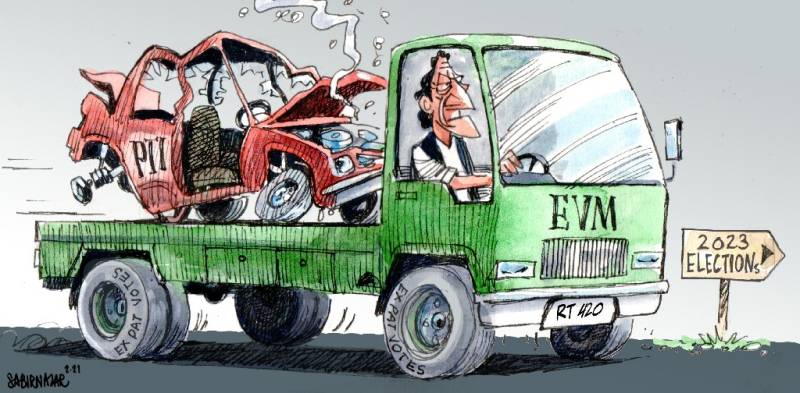
Saudi Arabia, which leads the Organisation of Islamic Cooperation (OIC) of 57 Muslim nations constituting over 1.3 billion people, has embarked on a reformist transformation of state and society under the leadership of Prince Mohammad bin Salman. Are there any lessons in this for Pakistan? Consider.
Wahhabism, that branch of radical Islamic theory and practice which has long defined the Faustian soul of Saudi Arabia under the House of Saud, is consciously being pushed back as a measure of state policy, and the Closed Kingdom is opening up to the global economy of the future when its diminishing oil revenues will not be able to cater to its increasing needs. Three significant steps are a sign of the new Saudi Arabia.
Saudi Foreign Policy is being overhauled. The dependence on the United States for arms and security is being reduced swiftly. The French and Russians are in business, selling state-of-the-art fighter aircraft and missile security systems worth tens of billions. Riyadh is also readying to stitch up relations with Iran, Qatar and Yemen with whom it has been at loggerheads for decades. Most significantly, it is about to establish diplomatic relations with Israel, a step that will forever change the political outlook and landscape of the Muslim World.
The Saudis are also pushing back on political Islam. Saudi funding for Wahhabi mosques and mullahs across the globe is drying up. At home, the laws are being changed to enable Saudi women to celebrate the freedom to travel, drive and walk without abayas or chaddars or male attendants.
These developments are aimed at preparing the cultural, social and political environment in which a $400B economic project along the Red Sea coastline can take off and flourish. This project aims to take a slice of the fastest growing Services (Banking, Finance, Tourism, Hospitality, etc) sector of the global economy which accounts for nearly $23 trillion or 25% of global trade and is growing at nearly 10% a year. This is a belated leaf from the strategic outlook of Dubai which recently further relaxed moral policing laws (eg, adultery, pre-marital sex, etc.) in order to encourage tourism and foreign investment.
Pakistan, meanwhile, is definitely headed in the opposite direction. The resurgence of “Islamism” today is directly linked to policies that birthed the Mujahidin in the 1980s, the Jihadis in the 1990s, the Taliban in the 2000s and now the TLP in the 2020s. In this process, Pakistan has alienated Afghanistan and India and suffered a terrible blowback of terrorism that has laid the state low. These policies have also diverted scarce economic resources away from productive investment, development, education, health and poverty alleviation and into military defence and physical security. The net result of these misguided state postures is a picture of Pakistan as a financially bankrupt and politically failing state. In the last three years of this hybrid regime, there is nothing positive to show for where the money has gone. No grand oil and gas pipelines have been laid. No big dams have been built. Karachi, the hub of trade and commerce lifelines, is still without a water desalination/reclamation plant or public transport system. Public utilities and corporations are bleeding at state expense. Inflation is galloping ahead in the region. Now Gwadar, that was once billed as the Gateway to Central Asia, is the target of Baloch separatists and the public is exploding with anger at denial of everyday rights like jobs, education, electricity, fishing, etc.
The most potentially explosive development is related to state policies of appeasing radical “Islamist” elements. This is manifest in the explosive rise of the Tehreek-e-Labbaik Pakistan that is a breeding ground for the sort of violence that erupted against the Punjab police last month or in Sialkot recently; in the misguided Single National Curriculum that brings religion to the forefront of public discourse; in the constant ill-informed references to the “state of Medina” by Imran Khan; and in the plethora of so-called “Islamist” laws and institutions that mock everyday life and freedoms in the modern world.
The army chief, General Qamar Javed Bajwa, seemed to sense some of these issues when he called for “resetting” Pakistan’s strategic goals, in principle aimed at “normalizing” relations with India and realignment to the West and its allies with whom Pakistan trades and from whom Pakistan borrows heavily to keep afloat. Unfortunately, however, his partner in the hybrid regime, Imran Khan, is unable or unwilling to subscribe to this reform of strategic policy because it may provoke a backlash from a public that has been brainwashed to the contrary for decades by the very Miltablishment that now wants to do a U-Turn.
Another unfortunate factor has now entered the equation. The United States is inclined to hold Pakistan’s responsible for its defeat in Afghanistan. So it is in no hurry to scratch Islamabad’s back by recognizing the Taliban regime or to bail it out by unfreezing its assets. In fact, Washington is pressing Pakistan to become an ally in its war against Al-Qaeda and Islamic State in Afghanistan, an objective that Pakistan cannot share without facing a terrible terrorist backlash. Meanwhile, the US has tightened the screws on Pakistan via the IMF and FATF and is now threatening to monitor and sanction its human rights record, especially regarding lack of minority rights, oppressive religious laws, disappearances, media censorships and crackdowns, etc.
It’s time for our ruling elites to recognize some harsh realities. Pakistan is internationally isolated. It is riven by internal frictions and fractures. Its political system has come a cropper. Its civil-military leadership is feeble, lacks courage and vision to change the status quo because it’s not ready to sacrifice its excessive perks and privileges. The National Action Plan is not worth the paper it is written on because there is no will to implement it. We have been forewarned. The unwashed masses are awakening to the call of the minaret to vent their rage.

